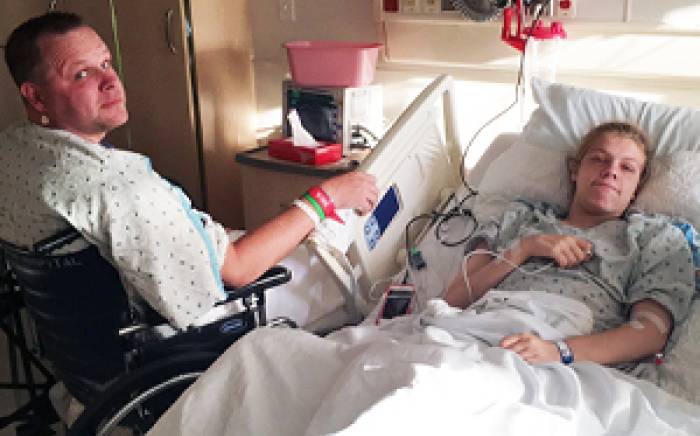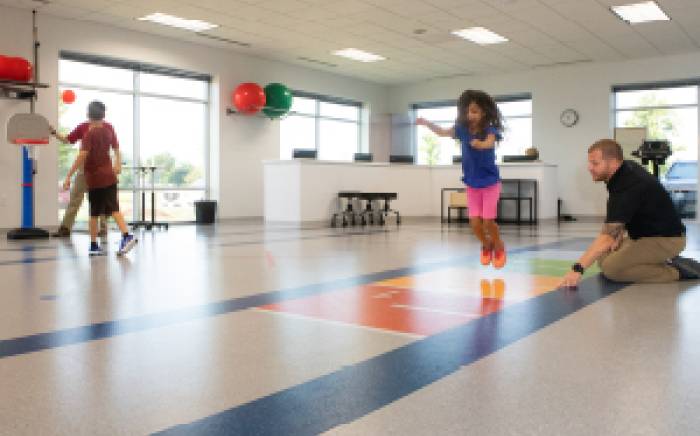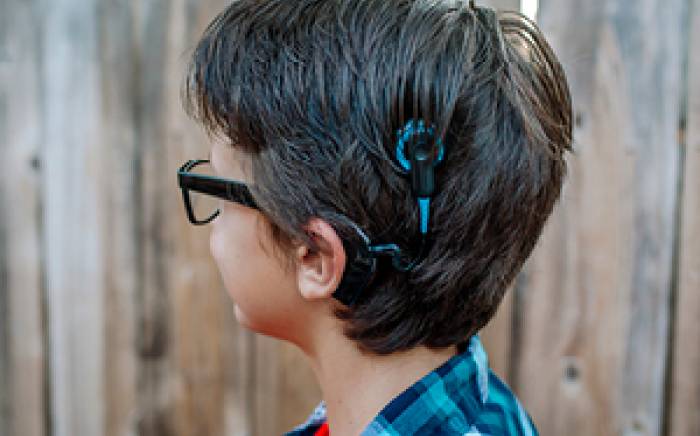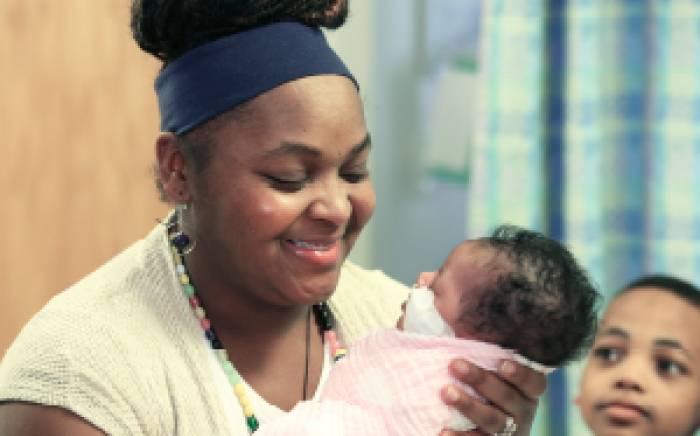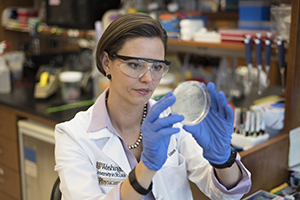 The Children’s Discovery Institute (CDI) board of managers recently voted to fund 13 new and wide-ranging pediatric research studies, four of which take aim at childhood cancers, including two clinical trials. In four other studies, researchers will tackle serious disorders of the gastrointestinal tract in children, including a life-threatening condition call necrotizing enterocolitis (NEC) that develops in some babies born prematurely. Funding also was awarded to two studies investigating different aspects of pediatric heart disease, as well as one designed to learn more about the long-term effects the Zika virus has on an infant’s brain.
The Children’s Discovery Institute (CDI) board of managers recently voted to fund 13 new and wide-ranging pediatric research studies, four of which take aim at childhood cancers, including two clinical trials. In four other studies, researchers will tackle serious disorders of the gastrointestinal tract in children, including a life-threatening condition call necrotizing enterocolitis (NEC) that develops in some babies born prematurely. Funding also was awarded to two studies investigating different aspects of pediatric heart disease, as well as one designed to learn more about the long-term effects the Zika virus has on an infant’s brain.
Following is a summary of the grant funding. For more information about CDI research, go to childrensdiscovery.org.
IN THE MCDONNELL PEDIATRIC CANCER CENTER:
• Washington University School of Medicine bioengineers Yongjian Liu, PhD, and Hong Chen, PhD, will use their CDI funding to develop an innovative strategy for the single-greatest cause of brain tumor-related deaths in children, diffuse intrinsic pontine glioma (DIPG). The research team will test the effectiveness and safety of using focused ultrasound to noninvasively, locally and temporally open the blood-brain barrier enough for ultra-small nano-clusters loaded with an imaging agent and chemotherapy drugs to infiltrate the tumor, allowing for imaging-guided therapy.
• Researchers Todd Fehniger, MD, PhD, medicine; and co-investigators Jeffrey Bednarski, MD, PhD; and Rizwan Romee, MD, medicine, will conduct a personalized clinical trial to determine whether a cellular immunotherapy strategy shown to be promising in adults with acute myeloid leukemia who relapse after a bone marrow transplant will be effective in children. The treatment uses “natural killer cells” that can be trained and activated in the lab and then essentially unleashed to destroy leukemia cells in the patient.
• Karen Gauvain, MD, PhD, pediatrics; and Gavin Dunn, MD, PhD, neurosurgery, will conduct the first-ever clinical trial to treat pediatric patients experiencing relapsed or recurrent brain tumors with a personalized vaccine—referred to as a peptide vaccine—developed by targeting genetic abnormalities in each individual tumor. The researchers will benefit from the School of Medicine’s emergence as a world leader in developing personalized vaccines to fight cancer.
IN THE CONGENITAL HEART DISEASE CENTER:
• CDI funding will enable pediatric cardiologist Jennifer Silva, MD, pediatrics, and co-investigator (and husband) Jonathan Silva, PhD, biomedical engineering, to test specially-designed goggles that project three-dimensional holograms of the patient’s heart, enhancing pediatric cardiologists’ line of sight into the heart. The technology will be used in the St. Louis Children’s Hospital Heart Center cardiac electrophysiology and catheterization laboratory, where patients routinely undergo procedures for heart rhythm abnormalities and congenital heart defects.
• Kory Lavine, MD, PhD, medicine, has been studying macrophages, important cells of the immune system that recognize and respond to infection by engulfing and destroying accumulating harmful or dead cells. In previous studies, Dr. Lavine showed that some macrophages can be put to work to repair cardiac tissue. Others are detrimental. Through new CDI funding and using mouse models, he teams up with Christopher Sturgeon, PhD, medicine, to determine whether macrophages associated with cardiac repair can be derived from one’s own stem cells.
IN THE CENTER FOR METABOLISM AND IMMUNITY AND CENTER FOR PEDIATRIC PULMONARY DISEASE:
• Addressing the fact that 30 percent of all pediatric intensive care unit deaths are the result of acute lung injury, Regina Clemens, MD, PhD, pediatrics, will use her CDI Faculty Scholar Award to learn more about how neutrophils—white blood cells that respond to both infection and inflammation, and can contribute to inflammatory tissue injury—are activated during inflammation and how this can be regulated to prevent tissue-damaging side effects.
• Brian DeBosch, MD, PhD, pediatrics, is working to find better treatments for non-alcoholic fatty liver disease. He will team up with Paul Hruz, MD, PhD, pediatrics, to study the sugar transporting protein, GLUT8. The research team will test the hypothesis that selective GLUT8 inhibition reverses fat accumulation in the liver. If they can identify selective, high-potency, small-molecule GLUT8 inhibitors and validate their effectiveness in pre-clinical models, they will be able to justify full-scale drug development with possible extension to human clinical trials.
• The inherited condition alpha-1 antitrypsin deficiency liver disease (alpha-1) is the most common genetic reason children undergo liver transplantation. However, only a subset of alpha-1 patients develops serious liver disease, which means other factors must influence disease risk. Currently, there is no way to predict which alpha-1 patients are at risk of developing liver disease or to prevent or reverse such development. Recent analyses show that genetic disruption of insulin-signaling reduces abnormal alpha-1 antitrypsin protein accumulation in both worm and mouse models of alpha-1. David Rudnick, MD, PhD, pediatrics; and Stephen Pak, PhD, will test drugs that disrupt insulin-signaling targets to identify novel candidate therapies for alpha-1 liver disease.
• Using mouse models, Jonathan Miner, PhD, medicine; Robyn Klein, MD, PhD, medicine, neuroscience; and Joseph Culver, PhD, radiology, will pursue a CDI-funded study to define the long-term effects of Zika virus (ZIKV) and other congenital infections on learning and memory. In a study that could have direct implications for pediatric disease, especially for ZIKV infection in children, the researchers will use optical tomography to determine the virus’ effects on the brain. Their findings could lead to therapies for this life-limiting infectious disease.
ADDRESSING DEVASTATING GASTROINTESTINAL ILLNESSES AFFECTING CHILDREN:
Necrotizing entercolitis (NEC) is the leading cause of death for premature infants after the second week of life, and so far, no preventive strategies have reduced its rate. The most prominent feature of this disease is the destruction of intestinal tissue; infants who somehow survive NEC require tube feeding, which puts the kidneys at risk. CDI is funding three investigations that aim to learn more about the biological processes that lead to NEC in premature infants and one aimed at setting up a system to test a treatment for short-gut syndrome that can follow surgery for NEC or other serious gastrointestinal conditions.
• Through her CDI Faculty Scholar Award, Misty Good, MD, MS, pediatrics, will work to identify the mechanisms in the gastrointestinal tract of premature babies. Using mouse models, Dr. Good wants to determine the components of breast milk that are protective against NEC and gain a better understanding of how NEC develops in order to thwart its development before damage to these fragile infants is done.
• Recent data suggest that a microbial imbalance—too much bad bacteria and not enough good—precedes the onset of NEC. Brigida Rusconi, PhD, a postdoctoral fellow at the School of Medicine, will use her new CDI Fellowship Award to follow up on an untargeted metabolic analysis that revealed the presence of a family of host lipids made by the gastrointestinal tract just prior to NEC onset. Dr. Rusconi’s study will define the role that these lipids play in NEC-related gut injury. Her findings could be used to identify at-risk babies to provide targeted care and prevention of this devastating disorder.
• The process of discovery for complex conditions, such as necrotizing enterocolitis, inflammatory bowel disease, and short-gut syndrome (SGS), is slower when experimental models omit key aspects of human biology. Kristen Seiler, MD, surgery, will use her CDI Fellowship Award to address this problem. In collaboration with Washington University biomedical engineers, Dr. Seiler will leverage bioengineered “organ-on-a-chip” microfluidic technology to develop a three-dimensional model that approximates small intestine physiology. Using this novel system, Dr. Seiler will explore a promising regenerative medicine treatment strategy for SGS. This will lead to new, targeted therapies for children suffering from SGS and other gastrointestinal illnesses.
• In a multidisciplinary approach combining cell biology, animal models and drug discovery, Stephen Pak, PhD, pediatrics; and Clifford Luke, PhD, pediatrics, will use their CDI award to screen novel compounds for their ability to stop the death of intestinal tissue, the hallmark of NEC. They will leverage their previous success at creating a model of intestinal tissue death in round worms (Caenorhabditis elegans) to keep the cost of pilot drug screens low and the pace of discovery high.
The CDI is a multidisciplinary, innovation-based research partnership between St. Louis Children’s Hospital and Washington University School of Medicine. Launched in 2006, the institute is focused on accelerating discoveries in pediatric research to ultimately find cures for the most devastating childhood diseases and disorders. It depends on the generosity of its CDI investors to achieve those goals.
For more information about CDI research, go to childrensdiscovery.org.


